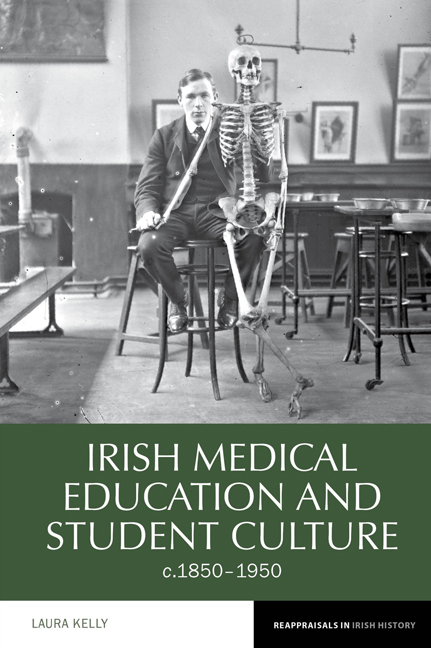Book contents
- Frontmatter
- Contents
- List of Figures
- List of Tables
- Acknowledgements
- List of Abbreviations
- Introduction
- 1 The Medical School Marketplace, c.1850–1900
- 2 ‘Entering upon an Honourable and Important Profession’: Irish Medical Student Image and Representation in the Age of Medical Reform, c.1850–1900
- 3 Beginnings: Medicine and Social Mobility, c.1850–1950
- 4 Educational Experiences and Medical Student Life, c.1880–1920
- 5 ‘Boys to Men’: Rites of Passage, Sport, Masculinity and Medical Student Culture, c.1880–1930
- 6 ‘This Feminine Invasion of Medicine’: Women in Irish Medical Schools, c.1880–1945
- 7 Medical Education and Student Culture North and South of the Border, c.1920–1950 200
- Conclusion
- Bibliography
- Index
6 - ‘This Feminine Invasion of Medicine’: Women in Irish Medical Schools, c.1880–1945
- Frontmatter
- Contents
- List of Figures
- List of Tables
- Acknowledgements
- List of Abbreviations
- Introduction
- 1 The Medical School Marketplace, c.1850–1900
- 2 ‘Entering upon an Honourable and Important Profession’: Irish Medical Student Image and Representation in the Age of Medical Reform, c.1850–1900
- 3 Beginnings: Medicine and Social Mobility, c.1850–1950
- 4 Educational Experiences and Medical Student Life, c.1880–1920
- 5 ‘Boys to Men’: Rites of Passage, Sport, Masculinity and Medical Student Culture, c.1880–1930
- 6 ‘This Feminine Invasion of Medicine’: Women in Irish Medical Schools, c.1880–1945
- 7 Medical Education and Student Culture North and South of the Border, c.1920–1950 200
- Conclusion
- Bibliography
- Index
Summary
Writing in his diary on 25 March 1935, James Lloyd Turner Graham, a student at the Royal College of Surgeons in Dublin, mused on the question of women in the medical profession:
Arose at 7:55. Went into college in Mr Robert's car. The anatomy room discussion, in one crowd, this morning was whether girls are successful doctors. I wonder do they. One never hears of them doing anything brilliant, but then there is only very few of them compared with fellows. Some say they are too tempremental [sic]. Some of them in the college do not seem to be very brilliant, yet they always pass their exams. I think they do not put much attention to anything too fickle, yet when it is necessary they can concentrate on the one thing and are strong-willed enough to exclude everything else. A fellow is not so strong willed and is more easily drawn away.
Graham's remarks on women in the medical profession were nothing new. Since the question of women's admission to the medical profession had emerged in the late nineteenth century, women's suitability for medical study had been hotly debated by members of the medical profession and the general public. Arguments against women studying medicine were rooted in Victorian beliefs about women's physical, mental and emotional natures which found their origins in physiological theories from the late nineteenth century. At the same time, those arguing in favour of women studying medicine suggested that women's emotional temperaments made them eminently suitable for a career in the field, particularly in the areas of women's and children's health, and that there were also opportunities for women doctors in the missionary field and in India.3 Irish women's rise in the professions was slow. In the 1900s, teaching was the main option for female university graduates, and it was not until the First World War that a discernible change in attitude occurred with regard to women doctors in Britain and Ireland.
This chapter aims to explore the history of women in Irish medical schools from the 1880s up until the 1940s. I will provide some background regarding the history of women's entry to Irish medical schools, suggesting that Irish institutions, albeit in some cases for financial reasons, were largely supportive of women's admission to medical schools as well as hospitals for clinical experience.
- Type
- Chapter
- Information
- Irish Medical Education and Student Culture, c.1850–1950 , pp. 170 - 199Publisher: Liverpool University PressPrint publication year: 2017



